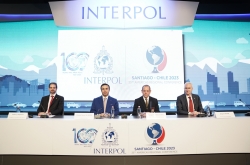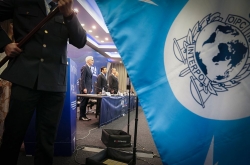Timeframe: 2023 to 2026
Budget: EUR 1.2 million
Donor: Korean National Police Agency (KNPA)
The situation
Drug trafficking is one of the crimes most frequently cited by member countries as posing a serious crime threat. Despite the COVID-19 pandemic and its associated restrictions on mobility of trade and transport, the market of drugs and illicit substances has continued to expand.
The trends have evolved: the supply chain has adapted to new restrictions; with new routes and a higher volume of drugs being shipped at once, contributing to a noticeable increase in maritime and cargo use for trafficking. Consumption trends for user have changed; and record-breaking seizures are being reported continuously.
There are lucrative markets for drugs syndicates in East Asia especially for synthetic drugs like methamphetamine and ketamine, which are increasingly popular with users. The Middle Eastern market is affected by a large amount of Captagon and more countries are seeing the devastating impact of fentanyl and other analogues.
By targeting countries known for supplying precursors, as well as transit and destination countries, Project Mayag aims to disrupt every step of the drug supply chain.
Objectives
Project Mayag aims to strengthen international cooperation and disrupt transnational criminal organizations involved in the manufacture, transportation and sale of synthetic drugs and counterfeit drugs containing illicit narcotics.
It will identify emerging trends, raise awareness, and develop best practices while providing analytical and investigative support to combat the threat of synthetic drugs. This project will target all aspects of the criminal supply chain including precursor chemicals used to manufacture illicit substances, international smuggling routes and wholesale and retail distribution.
While there is an emphasis on countries in the Asia-Pacific region, this project is a global initiative.
Project activities
Project Mayag’s activities are based across three main pillars:
Pillar 1: Operations
This comprises regional and transnational operations, including the deployment of operational support teams and case coordination meetings.
Pillar 2: Analytical Support
This support includes operational analysis such as INTERPOL Notices and operational reports, and operational knowledge sharing.
Pillar 3: Technical Support and Capacity building
This pillar will provide beneficiaries with training on the following areas:
- INTERPOL’s Relief Database
- INTERPOL’s capabilities and expertise to support member countries
- Clandestine laboratories and passenger profiling
- Financial investigations trainings for drug cases
- Biometrics
Noticias conexas








